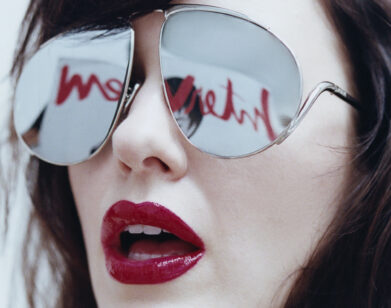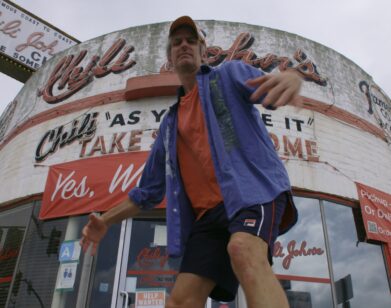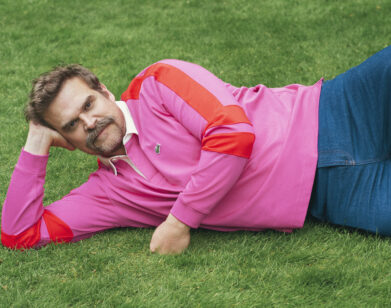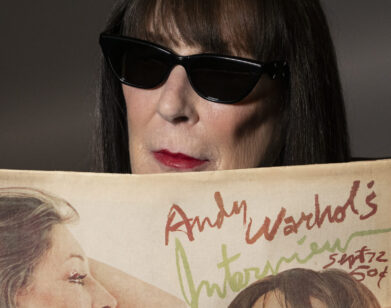John Waters on Kitten with a Whip, A Would-Be Cult Classic
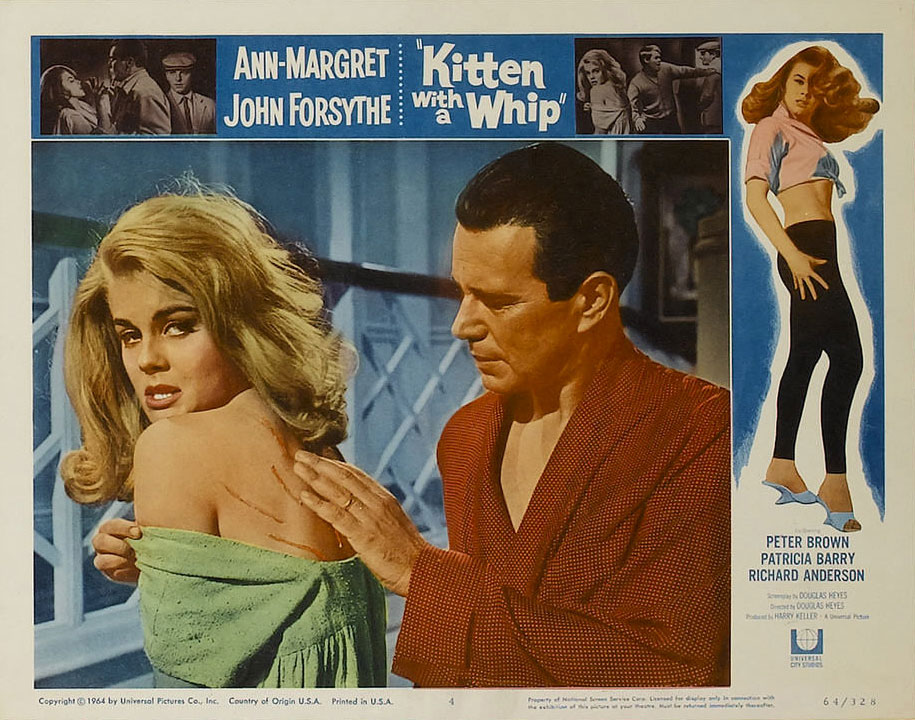
JOHN WATERS. PHOTO COURTESY OF SOMETHING WEIRD VIDEO
“Why do you think you’re such a smoky somethin’ when you’re nothin’ painted blue?” Richly hued and jazzy, Douglas Heyes’ Kitten with a Whip exudes the type of lay-it-on sex appeal, wanton hijinks, and utter cool that charmingly teeters on parody. The 1964 melodrama-cum-B-movie stars Ann-Margret as Jody Dvorak, a flirtatious firebrand and juvenile hall escapee, and John Forsythe as David Stratton, the politician whom she manipulates and traps in his suburban home. Equipped with all the right trimmings—a noirish score, indulgent clawing and hammy scratch marks, narrow escapes, bouffant coifs, a wife’s lipstick-smeared photograph, a neighbor’s suspicions—it’s no wonder that John Waters will be introducing Kitten with a Whip at Anthology Film Archives on Friday, February 4th as part of an ongoing series of events celebrating their 40th anniversary.
Waters, whose deep appreciation for the film is apparent in his own work, shared with Interview some of his earliest memories of seeing Kitten in theaters.
DURGA CHEW-BOSE: Hi John!
JOHN WATERS: Hello!
CHEW-BOSE: I just saw Kitten with a Whip yesterday…
WATERS: I watched it too, because I haven’t seen it in… I paid to see it when it came out in whatever year it was. I’ll have to look it up.
CHEW-BOSE: 1964.
WATERS: Yes, ’64. God, the height of my LSD years! And I paid to see it and we loved it. But watching it again, I didn’t realize how arty it was.
CHEW-BOSE: Yeah, really arty. The opening scene with the jazzy music and Ann-Margret running in her nightgown beside that moving train…
WATERS: And even the credits, too, are great! The whole movie really stood out to me, and she never looked greater. She is fucking gorgeous in this movie. When I was young, I had movie posters in my house everywhere. Now, in only one place where I live do I have a movie poster, and it’s Kitten with a Whip.
CHEW-BOSE: It’s a great poster.
WATERS: I think it’ll be a perfect movie for me to present, especially for Anthology Film Archives. Which to me, I mean Jonas Mekas—I’d read his column in the Village Voice—and he’s like the patron saint, to me, of movies.
CHEW-BOSE: It was amazing to see the influence Kitten has had on your films. And you know, the little that’s out there about the film is mostly focused on how terrible it was as a movie. But I really loved it. It didn’t feel terrible at all.
WATERS: Yeah, I think it’s not one bit terrible. It reminds me of a film noir. It’s almost like a Russ Meyer movie, an early one, only without as much tits. There was a whole bunch of movies from that period that started with people in turmoil, like with someone breaking into a house. You know what I mean? Like Lady in a Cage, or Penthouse—all these movies about juvenile delinquents taking over. And I think it was a period when a lot of movie stars tried to make these arty ones. Carroll Baker made a movie called Something Wild. There was a movie that I really love called A Cold Wind in August.
They were these early-’60s art films that were American, but yet were made with movie stars that wanted to be cutting-edge and prove they could act rather than be sex kittens. But then, with a title like Kitten with a Whip, it’s kind of hard to be taken seriously, you know? Isn’t that probably the same year These Boots Were Made for Walking came out? So it was a foot fetish year, you know? It was an S&M kind of thing. Kitten with a Whip, the Velvet Underground—well, they came a little later—but it was this S&M thing that was very new and very sexual.
CHEW-BOSE: I mean actors are still trying to find those more subversive, arty roles.
WATERS: Of course! You know, it’s called Oscar bait. [laughs] But really, I mean when [Ann-Margret] scratches him, I love that! That’s really when she’s a kitten with a whip!
CHEW-BOSE: Those scratches are ridiculous! Totally overdone and gratuitous. It’s great.
WATERS: I know. And when she says, “Where I come from is outer space.” There’s some great lines.
CHEW-BOSE: She’s really jazzy, the way she talks. Like when she first meets David, she says stuff like, “I feel so shiny good about you,” or “Everything’s so creamy!”
WATERS: Yeah, it’s beatnik talk. It’s jazz, hipster talk. And that’s what they are—fake beatniks—the two men, her friends that show up, the leader is like a Jack Kerouac-type.
CHEW-BOSE: I mean, he’d like to be…
WATERS: Yeah, yeah. That even makes it better because it’s just all this lingo. The title is double-edged because it kept the movie from ever being taken seriously. I mean I don’t know if it ever got a good review, did it?
CHEW-BOSE: No, not really. People appreciate it now in a fetishistic way. It’s seen as a campy, cult classic, but…
WATERS: But it doesn’t even play that much now. It’s not a cult film; it never became a midnight movie.
CHEW-BOSE: It definitely feels like one of those lost films.
WATERS: You know, for hipsters today, it’s really easy to like. It’s a cool movie, in the real meaning of that word, in the beatnik meaning of the word.
CHEW-BOSE: It’s very cool. And it begins so quickly without any explanation as to what is going on, and before you know it, you’re involved.
WATERS: Yes, yes. I thought the greatest scene when she was being defiant and behind her are the cartoons on the television.
CHEW-BOSE: Yeah, Sylvester the Cat.
WATERS: Oh, it’s so arty; it’s really my favorite scene. And the other thing that you may not realize is that at the time John Forsythe was on a very big hit television show, called Bachelor Father. Kind of like a normal, American family show. So when he played that part, it was shocking. It would be like if Beaver Cleaver’s father got held hostage by a juvenile delinquent. This is way before he was on Dynasty. Dynasty was his big comeback! So you know, that’s what makes it even more insane that Ann-Margret was holding him hostage and tormenting him.
CHEW-BOSE: She’s pretty convincing as this crazy but hurt young woman. The way her eyes swell, even the way she circles him like a shark in certain scenes.
WATERS: It was not an exploitation movie. It was sold as an exploitation movie, and it had a little of that, but it was really an art film.
CHEW-BOSE: In terms of its influence, say for your work, I was listening to an interview that you had done last year soon after your book of essays, Role Models, came out. You mentioned your appreciation and attraction to the villain—be it Captain Hook or the witch in The Wizard of Oz. In this film, Ann-Margret’s Jody is the villain, but also a sweet and sincere hero. I mean, she begins the film as a veritable Goldilocks sleeping in David’s daughter’s bed.
WATERS: Oh, I mean Divine and I saw this movie together, definitely. Several times, actually. And he loved it, too. It was very much a big influence on us. And in 1964, I was a senior in high school, so on LSD, so angry, so insane, and so it came at one of the most insane periods of my life as far as being a disturbed teenager. I mean, we wanted to be Ann-Margret! Divine was my Kitten with a Whip, in a weird way. [laughs]
CHEW-BOSE: And what do you think about Lindsay Lohan showing interest in doing a remake?
WATERS: Well, she’d be great at it! If they were going to make it—I don’t think right now, for her, it would be the best career move—but she certainly looks like she’d be great at it. It makes perfect sense, almost. And Lindsay can act—that’s the thing. She is a good actress, I think. Let’s hope she can have a comeback, because I like her in movies. But her comeback should not be Kitten with a Whip.
CHEW-BOSE: To go back to what we were talking about earlier, Kitten with a Whip doesn’t feel like a cult classic, it…
WATERS: Look, it’s a great film, and you know I’m screening this film not as a camp movie, but as an undiscovered art movie that people should see for real.
CHEW-BOSE: So when films are referred to as cult classics or camp classics, what do you think that means? That’s it’s so bad it’s good? Or that…
WATERS: It sometimes could mean that. But then there are other movies that are in on it. Like Showgirls, I don’t believe [director Paul Verhoeven] was in on it. I mean, he says he is now. But I think he was originally serious about it. But I was in on it. When I made Pink Flamingos, I knew what it was. Certainly, Eraserhead, David Lynch, a beautiful movie that was in on it. But Kitten never became a midnight movie. It might be too arty to be a midnight movie, although I can imagine people standing up and shouting out some of that dialogue. It’s just an art film that fell through the cracks, and has a title that is notorious, basically. And that poster is notorious. It’s a movie that takes itself fairly seriously.
It’s fun to watch Ann-Margret be a juvenile delinquent, all juvenile delinquent movies are fun, but this is a juvenile delinquent movie too late. Because those movies were in the ’50s. This is a ’50s movie made too late. When the neighbors show up, it’s very Douglas Sirk. That’s very Magnificent Obsession. I don’t know much about the director, Douglas Heyes. He did a lot of TV. So I’m curious to see what people will think. I hope people come and see it, and discover it.
JOHN WATERS WILL PRESENT KITTEN WITH A WHIP AS PART OF ANTHOLOGY FILM ARCHIVES’ 40TH-ANNIVERSARY CELEBRATION ON FRIDAY, FEBRUARY 4, AT 7:30 PM. FOR MORE INFORMATION, VISIT ANTHOLOGY’S WEBSITE.


